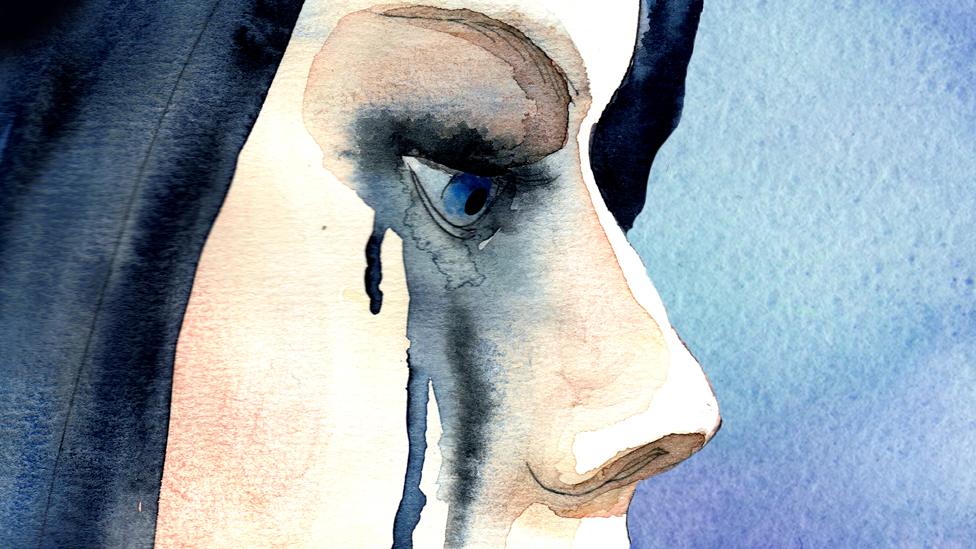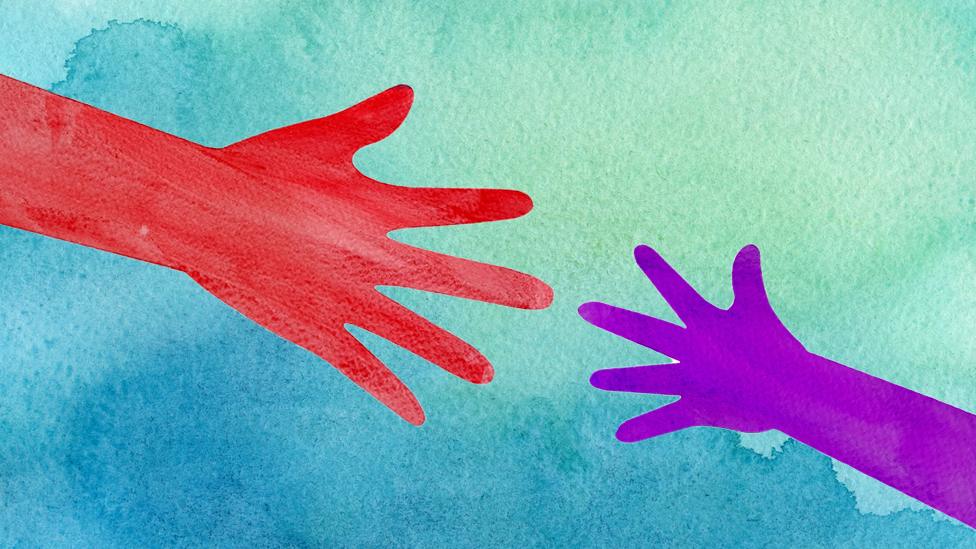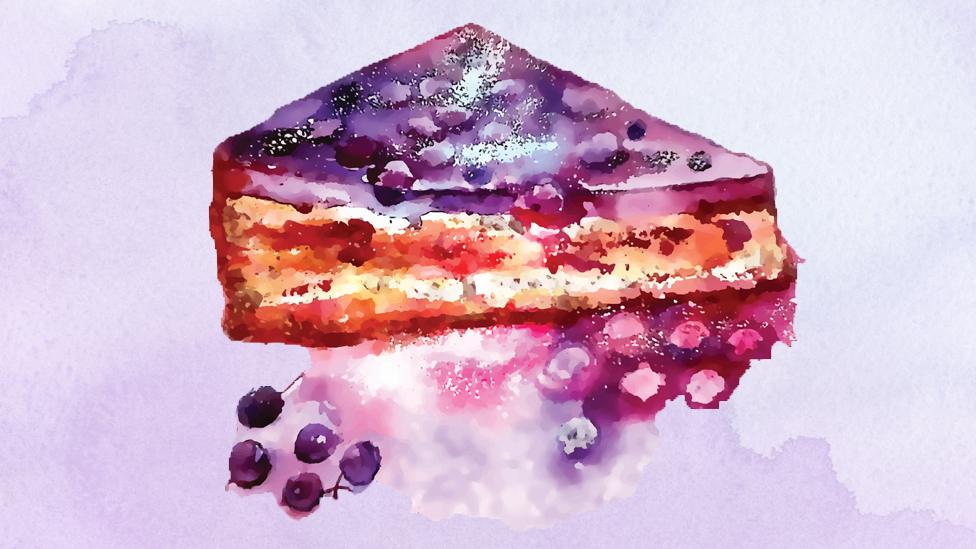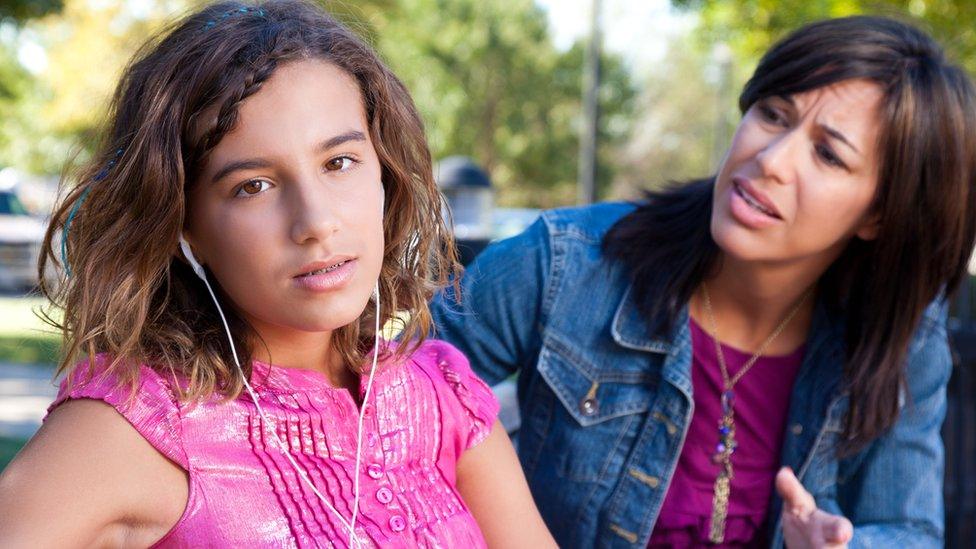'My teacher saved me from suicide'
- Published

Hati Sparey-South is now a trainee teacher
By 16 Hati Sparey-South had already tried to kill herself. And she would have tried again and maybe succeeded if it hadn't been for a teacher who noticed how unhappy she looked.
Hati says she owes her teacher her life. And now, aged 26 and a trainee teacher herself, she is determined to help today's pupils.
"I would have kept doing it. And I would have been in exactly the same position as three of my friends are now, which is dead at 20," she says.
"I had been suffering with very pronounced depression from the age of 14.
"I was mostly super-sad. And I couldn't sleep, so it just perpetuated."
Her parents were separated and her mother was in and out of hospital.
"There was a lot more focus on my mum not being very well, so I didn't get a lot of attention like, 'How are you coping with this? How are you feeling about this? What's happening to you emotionally?'"
Finally someone asked
It was Hati's GCSE year. And the lesson was design and technology.
"I don't know what day it was or anything like that. But I just remember the moment. And I was wearing a really awfully adapted Motorhead T-shirt that my dad's girlfriend had given me. And I'd just got all my hair cut off.
"It's not like she was particularly targeting me. She was just a genuinely very nice person. And she obviously maybe saw that I wasn't 100%.
"She just said, 'Hey, are you all right? How's it going?'
"She actually listened to what I said and remembered everything I'd said and was actually having a conversation with me, which had never happened to me before.
"I was like, 'Oh OK. Um, I feel really bad actually. I feel really sad. And I keep crying.'
"She would always ask people how they were. But it really hit me because I hadn't had that. So I had a massive cry. But I was wearing a lot of black eye make-up and it was a messy affair, very messy."
Despite her key role, Hati's teacher opted not to be interviewed, preferring to remain in the background - but Hati says her quietness and kindness really helped.
"She was very mousey. She didn't interrupt people's flow. So I just let everything out and she was like, 'Oh my God. That's horrible.'
"And I was like, 'It is horrible, right? Really horrible.'"

With her teacher's support, Hati got help.
She ended up spending a lot of time in the design-tech classroom, both during and after school. Her struggles continued, both emotional and academic, but she persevered, got GCSEs and then A-levels.
There was a gap year, some dead-end jobs, a fashion and textiles degree and another gap year.
She got married and one day, her husband, a biology student, said he was considering a teaching career.
"And I said, 'Maybe I want to do teaching. That sounds fun. I love children.'"
A few weeks of voluntary work had her hooked and she is now a trainee design-technology teacher, mirroring her former teacher's career and determined "to be the stability" in children's lives.
'Me in a nutshell'
During her training, Hati has already met pupils who remind her of her teenage self and she gives up her free time to support them.
"The short hair, the wringing of the hands... a bandage on one arm which means, usually it means, self-harm.
"And I was thinking, 'That's just me. That's just me in a nutshell.'
"And I was thinking, 'OK, I can give you something if you are willing.'

"So what I did is I just talked about my experience whenever it was possible, whenever it was relevant - just little snippets, not pushy.
"And we had some amazing conversations and I worked really hard with them.
She feels she has already begun to make a difference.
"I got many letters but this was a beautiful one, 'You have helped me so much. More than you could ever know. You are going to be a great teacher.'
"It made me cry."

Teenage depression
The World Health Organization says one in five adolescents may have a mental health problem in any given year.
Other research suggests half of mental health problems are established by the age of 14 and 75% by the age of 24.
Last year in the UK a government funded study of 10,000 young people, external found a quarter of the girls and nearly one in 10 boys showed signs of depression by 14, with poorer teenagers worst affected.
Depression can mean continuous low mood or sadness, with little motivation, interest and enjoyment in life.
Other symptoms include feeling:
hopeless, helpless, anxious or worried
low self-esteem
guilt-ridden
tearful, irritable or intolerant of others
difficulty in making decisions
suicidal or a desire to self-harm

Hati says she now has an idea of how her own teacher would have felt 10 years ago - "how I hope she must have felt when she was doing those things for me".
"It was just the icing on the cake, the cherry on top, for me to have come full circle, to literally be in the exact same position.
"In a way I used her as my mental stepping-stone to get myself to a place where I could do that for myself and then get to the place where I could do it for other people, which is amazing.

"Because, probably, if I hadn't met her, I would have been OK for a bit, maybe a year or two, and then I would have gone back into the dark areas of my mind and it probably would have happened again.
"It's blowing my own horn a bit, but I would have deprived that child of me if I had done what I wanted to do at that age, you know?"
She hopes the pupils she helps will, in their turn, help others.
"That's why I was so inspired by the giving of hope.
"It seems such a small thing but it's unbelievably powerful when you say to a kid, 'How are you?' when they come into the classroom and, you know, even if they're like, 'Fine,' they will have heard you.
"You tell them they are wonderful and they're gorgeous and they're a gift and that they can't take gifts back, 'So once you're here, you're here and that's it. Tough. We love you.'"
- Published20 September 2017

- Published4 December 2018
